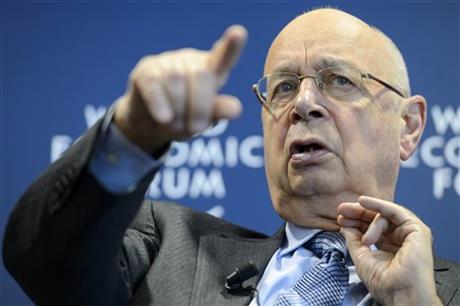
By JOHN HEILPRIN
German Klaus Schwab, founder and president of the World Economic Forum, WEF, gestures during a press conference, in Cologny near Geneva, Switzerland, Wednesday, Jan. 15, 2014. The World Economic Forum unveiled the program for its annual meeting in Davos, Switzerland, including the key participants, themes and goals. Conflicts like the war in Syria and getting the world economy back on track will be the focus of next week’s gathering of world leaders and power brokers in the Swiss ski resort of Davos. (AP Photo/Keystone, Laurent Gillieron)
GENEVA (AP) — Conflicts like the war in Syria and getting the world economy back on track will be the focus of next week’s annual gathering of world leaders and power brokers in the Swiss ski resort of Davos.
Organizers of the World Economic Forum said Wednesday that hundreds of public figures are expected to attend, including the leaders of Iran, Israel, Japan and Britain.
This year’s event will coincide with the start of the first face-to-face negotiations between the Syrian government and opposition, which will also take place in Switzerland, in the cities of Montreux and Geneva. But the forum’s organizers said they do not yet know how many of the ministers who will be at those talks might then join the event in Davos.
The forum’s founder, Klaus Schwab, told reporters Wednesday at the organization’s lavish headquarters overlooking Lake Geneva that the event seeks to “push the reset button” on the world’s crisis mode.
He expects there to be “cautious optimism” among the attendees, but also realistic expectations about what could be achieved. It will be hard, for example, to expect the global economy to return to the high growth rates it enjoyed before the 2008-09 financial crisis.
“Confidence seems to come slowly back,” Schwab said of the world economy. “It’s like running with a heavy backpack on your shoulders.”
Among the world leaders attending will be Iranian President Hassan Rouhani, Israeli Prime Minister Benjamin Netanyahu, Japanese Prime Minister Shinzo Abe, Australian Prime Minister Tony Abbott, Brazil’s President Dilma Rousseff, Myanmar’s President Thein Sein and British Prime Minister David Cameron.



